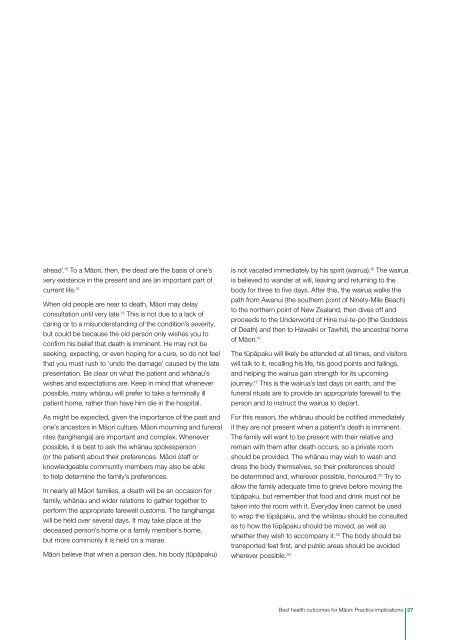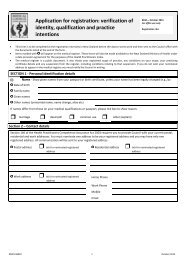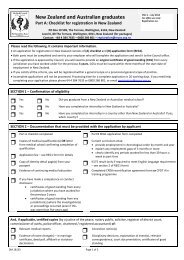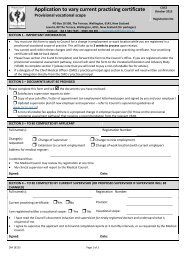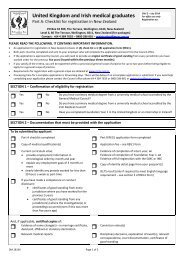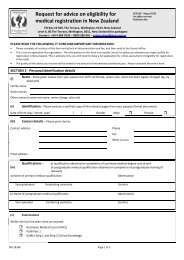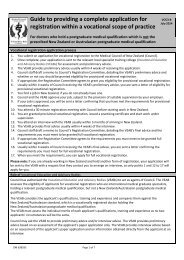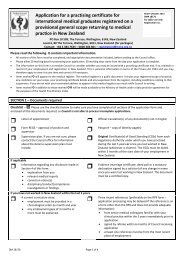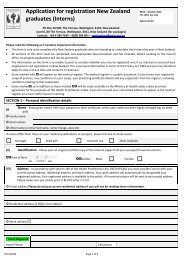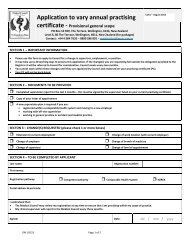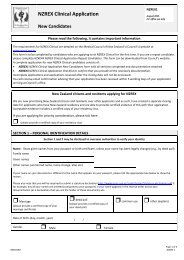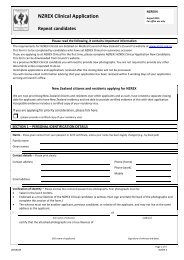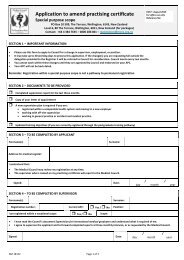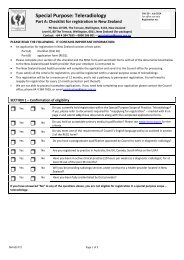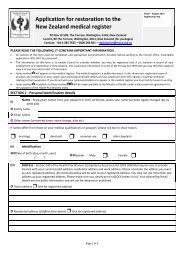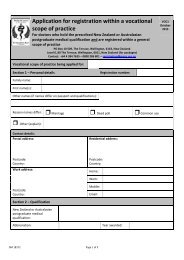Best health outcomes for Maori - Medical Council of New Zealand
Best health outcomes for Maori - Medical Council of New Zealand
Best health outcomes for Maori - Medical Council of New Zealand
Create successful ePaper yourself
Turn your PDF publications into a flip-book with our unique Google optimized e-Paper software.
ahead’. 15 To a Mäori, then, the dead are the basis <strong>of</strong> one’s<br />
very existence in the present and are an important part <strong>of</strong><br />
current life. 15<br />
When old people are near to death, Mäori may delay<br />
consultation until very late. 15 This is not due to a lack <strong>of</strong><br />
caring or to a misunderstanding <strong>of</strong> the condition’s severity,<br />
but could be because the old person only wishes you to<br />
confirm his belief that death is imminent. He may not be<br />
seeking, expecting, or even hoping <strong>for</strong> a cure, so do not feel<br />
that you must rush to ‘undo the damage’ caused by the late<br />
presentation. Be clear on what the patient and whänau’s<br />
wishes and expectations are. Keep in mind that whenever<br />
possible, many whänau will prefer to take a terminally ill<br />
patient home, rather than have him die in the hospital.<br />
As might be expected, given the importance <strong>of</strong> the past and<br />
one’s ancestors in Mäori culture, Mäori mourning and funeral<br />
rites (tangihanga) are important and complex. Whenever<br />
possible, it is best to ask the whänau spokesperson<br />
(or the patient) about their preferences. Mäori staff or<br />
knowledgeable community members may also be able<br />
to help determine the family’s preferences.<br />
In nearly all Mäori families, a death will be an occasion <strong>for</strong><br />
family, whänau and wider relations to gather together to<br />
per<strong>for</strong>m the appropriate farewell customs. The tangihanga<br />
will be held over several days. It may take place at the<br />
deceased person’s home or a family member’s home,<br />
but more commonly it is held on a marae.<br />
Mäori believe that when a person dies, his body (tüpäpaku)<br />
is not vacated immediately by his spirit (wairua). 15 The wairua<br />
is believed to wander at will, leaving and returning to the<br />
body <strong>for</strong> three to five days. After this, the wairua walks the<br />
path from Awanui (the southern point <strong>of</strong> Ninety-Mile Beach)<br />
to the northern point <strong>of</strong> <strong>New</strong> <strong>Zealand</strong>, then dives <strong>of</strong>f and<br />
proceeds to the Underworld <strong>of</strong> Hine nui-te-po (the Goddess<br />
<strong>of</strong> Death) and then to Hawaiki or Tawhiti, the ancestral home<br />
<strong>of</strong> Mäori. 15<br />
The tüpäpaku will likely be attended at all times, and visitors<br />
will talk to it, recalling his life, his good points and failings,<br />
and helping the wairua gain strength <strong>for</strong> its upcoming<br />
journey. 15 This is the wairua’s last days on earth, and the<br />
funeral rituals are to provide an appropriate farewell to the<br />
person and to instruct the wairua to depart.<br />
For this reason, the whänau should be notified immediately<br />
if they are not present when a patient’s death is imminent.<br />
The family will want to be present with their relative and<br />
remain with them after death occurs, so a private room<br />
should be provided. The whänau may wish to wash and<br />
dress the body themselves, so their preferences should<br />
be determined and, wherever possible, honoured. 50 Try to<br />
allow the family adequate time to grieve be<strong>for</strong>e moving the<br />
tüpäpaku, but remember that food and drink must not be<br />
taken into the room with it. Everyday linen cannot be used<br />
to wrap the tüpäpaku, and the whänau should be consulted<br />
as to how the tüpäpaku should be moved, as well as<br />
whether they wish to accompany it. 50 The body should be<br />
transported feet first, and public areas should be avoided<br />
wherever possible. 50<br />
<strong>Best</strong> <strong>health</strong> <strong>outcomes</strong> <strong>for</strong> Mäori: Practice implications 2


